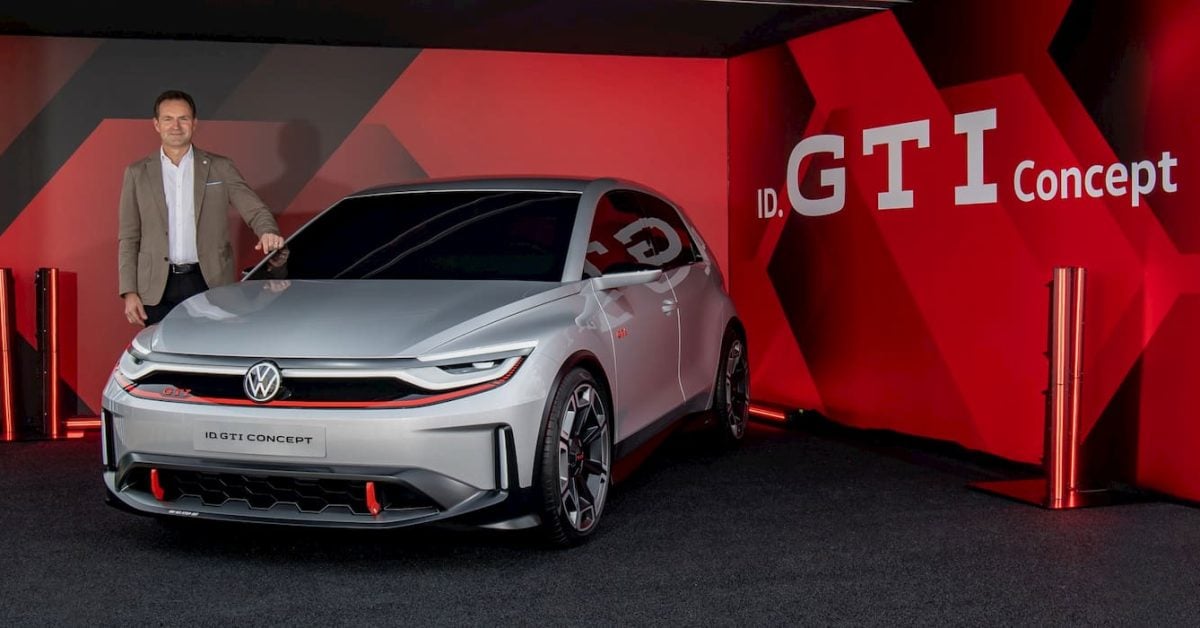According to Grunitz, Volkswagen’s first electric GTI will be “a real go kart” to drive. He’s already driven a prototype, claiming, “It’s really amazing.”
You can see the concept pulls design features from VW’s classic GTI models. However, the company promises new tech will enable even more control and handling for that “go kart” like feel.



Starting at 27,000 dollars though. I wish more effort was put into dropping the price as low as possible. The industry knows that a cheap car would sell huge volumes, but with CAFE, small cars are not where the profit is.
27,000 would be among the cheapest new cars available. We’ve come a long way from when EVs cost more than ICE models.
Yes, though my comment was more pointed to how the CAFE regulations incentivize auto manufacturers to create larger vehicles for the higher profits. If the US didn’t start leaning towards trucks and SUVs back then and instead kept innovating what cars could be, the competition in the compact car space would have driven prices further down.
The fact that 27k is considered among the cheapest new cars is partially a result of automakers discontinuing their cars in favour of larger vehicles with juicier profits.
I dont like large vehicles either and the trend. But $27k is still not that high, inflation just makes it seem that way. A new RAV4 is cheaper than they were in the 90s despite being s bigger and more premium now.
https://www.theautopian.com/somehow-the-2024-toyota-rav4-is-4000-cheaper-than-the-1996-model-but-how-much-better-is-it/
27k today is the equivalent to $13500 in 1996. I’m guessing the new GTI will be a lot nicer than what you got back then, thats the price of a base Cavalier.
I can agree with that. Undoubtedly there’s better value now than what there was thirty years ago. I think my gripe is moreso seeing other countries having 10k EVs available and there not being a simple way to get one in North America.
I’d just like to see us have more options. Without a single contender less than 15,000 dollars, we’re sort of stuck buying bigger and pricier cars.
Batteries and electric motors are still pretty expensive to manufacture. I don’t think a budget EV would be available until a new, cheaper battery tech comes out.
You’re right they are expensive components, though I’d point out the battery tends to be the cost leader of the drive train by a significant margin. The motors are increasing over time, but not enough to surpass the battery.
Drive traintrain cost breakdown:
With this in mind, the average electric car has range of 200 miles, with the most popular model pushing beyond 300. The battery could easily be cut in half in order to lower the vehicle cost.
Don’t get me wrong, I know half the battery doesn’t mean the car would be half the price, but it would be a good chunk. And in today’s market, every dollar saved matters.
I agree with the reduced battery idea, but you’ve got to consider that would significantly reduce the life of the battery and slightly reduce max torque output as well. For me that wouldn’t be as important, but for many people that’s a huge negative. They expect the battery to last as long as, say, a manual transmission.
I haven’t seen any data suggesting degradation is worse in smaller capacity batteries, but even if it is, degradation as a whole isn’t as a big a deal as might be believed. It was significant ten years ago, but insignificant today.
I’ll take your word for it on the torque point. I don’t remember much about EV torque comparisons but it makes sense on the face of it that if you lose a bunch of the energy, some of the torque goes with it.
On battery replacement due to degradation:
Non recall replacements (by year of manufacture):
That’s an order of magnitude improvement in half a decade, and the best of that is already ten years old. Battery technology is only getting better, and with better batteries, we could afford to put smaller ones in a commuter car and sell them cheaply.
I agree.